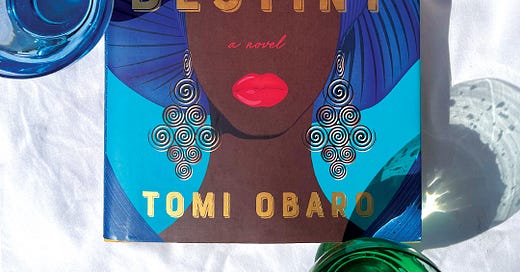The unwavering story in "Dele Weds Destiny" invites us to review our influences in relationships: friendships, family and selves.
Title: Dele Weds Destiny
Author: Tomi Obaro
Genre: Fiction
No of pages: 256
Yr. Of Publication: 2022
ISBN: 978059332029
Publisher: Alfred A. Knopf
Tomi Obaro's debut novel "Dele Weds Destiny" is the story of three different women; Funmi, Enitan, and Zainab who first met at university in Nigeria, and become friends despite their differences in perspectives, religions and grit.
Zainab, tall dark-skinned, slim exasperatingly beautiful- raised by her father's first two wives after her mother's death in childbirth, would be the first to get married to her father's friend -Ahmed and soon the union will produce four sons.
"The irony of Zainab, the only one of the trio who didn't read nursing, becomes a full-time caretaker to her husband who has suffered a series of strokes making him completely paralyzed on his left-hand side…"
Funmi is beautiful, brash and determined- partly raised by her mother (who dies in a car accident), a father who remarries a woman who would be the reason she moves to Kaduna marries Yinka and the union produces a daughter-Destiny, one of the titular character of the novel.
She becomes the richest of the trio- "as in-she-has-an apartment-in London, shops-at-Harrods rich, as in, she also has-a-house-in-Lekki-and -a-sprawling-compound-in-her-husband's village-rich. As in tinted-black-SUV-windows rich and walk-in-closet-full-of-brand-name-shoes-she-seldom-wears rich…".
Enitan is reserved and homely, raised by a single mother whose expression of love pushes her to pursue her career in far away state-Kaduna, and marries the first man to ever look at her, a red-headed Peace Corps volunteer from Connecticut.
The union produces a daughter-Remi whose ways differ from what Enitan expects.
After thirty years, the trio will unite in Lagos for the wedding of one of their daughters and using flashbacks and shuffling through present happenings, Tomi takes the reader on a journey of self-discovery, defining 'self', the true definition of relationships and standing up for oneself.
The novel is divided into three different parts which hold a body of stories that reveals how the trio meet, the events that led to the pause in their physical relationships as friends and how each of them got married to their spouse.
• Part I: Lagos, Dec 2015,
• Part II: Zaria, Kaduna, 1983-1988
• Part III: Lagos, Dec 2015
The storyline was an evolving one with characters that a reader could easily relate with and the themes ? They weren't certainly what I was expecting. We're so used to getting the African traditions, politics, romance and childhood days stories and themes but Tomi presented lessons we could relate and easily build an image by connecting dots and conversations.
I did enjoy the characters' backstories but there were certain characters I feel Tomi could have provided and relieved some tension around them: Funmi was coloured as the antagonist of the novel and I think she stood as the distinct character who knew what she wanted and how to get it.
Reading through her relationship with her Dad, how she stood up to him finally, severing their relationship—"Daddy, there's no reason for you to come here."(Chap 15, 129). Her short sex escapades with Damola, her marriage and her relationship with her daughter, I could feel her voice and how she tried to cover up for her loneliness through these relationships. She created an engaging difference and I felt she didn't receive positive recognition.
There was also the titular character- Destiny. You know, this is the first novel I would read where the storyline isn't about the titular characters which are intriguing, I must say.
Tomi introduces her as a quiet girl who was once advised by a teacher to visit a therapist due to her reticent behaviour. Destiny also supplies a hint of how she defines her ‘self'—
"Sometimes I feel so sad I can't move," said Destiny. I want to lie in bed all day. And my parents don't understand. I don't understand it."
Walking through the activities around her wedding preparations, we get little insights into her perspectives and how she tried communicating how she felt about everything to her mum.
It was quite easy to have a heart-to-heart talk with Zainab but her mum? She felt threatened. Then it becomes quite odd, that a character who had been coloured this way finds the strength to voice how she felt after her traditional wedding ceremony, after taking alcohol and cigarettes.
I think she had opportunities to voice out sooner, Funmi persuaded her, asking her what she wanted, Zainab did too but she kept mute until the last minute.
I felt Destiny's backstory and her traits weren't justified. She was meant to be portrayed as a symbol of standing up for oneself but sufficient ideas and aligning thoughts weren't infused here.
I did enjoy the scenes created in the novel, and the cultural traditions here in Nigeria and through Enitan, we got a peek into the perceptions and beliefs of citizens in the United States.
There was also the quiet true definition of relationships — Enitan walking with Funmi's pregnancy decision even though the former had opposing thoughts about it, Funmi and Enitan supporting Zainab in her decision: marrying Ahmed and convincing her dad to accept the union and Zainab and Destiny's godmother -goddaughter relationship which revealed salient ideas about who Destiny was.
The novel is a well-defined body of different perspectives and a mirror that reflects how individuals react and reveal their thoughts, emotions and inner voices to the outside world.
It also touches on this school of thought I love-the power of loneliness and silence and how they can make or mar you.
If this book aligns with you, make a date with it on a Friday and share with others.
photo credit: Tolu Ogunlesi.


